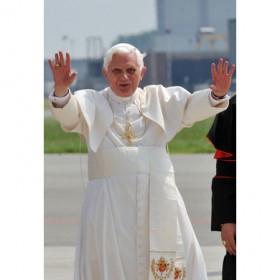Wikileaks. Il Vaticano pronto a fare lobbying a favore dell’accordo di Copenaghen sul clima
 L’ambasciata americana presso la Santa Sede fece pressione per ottenere l’appoggio del Vaticano a favore dell’accordo di Copenaghen sui cambiamenti climatici (dicembre 2009) che era stato fortemente voluto dagli Stati Uniti. A rivelarlo è un messaggio confidenziale dell’ambasciata, datato 21 gennaio 2010, finito nelle mani di Wikileaks.
L’ambasciata americana presso la Santa Sede fece pressione per ottenere l’appoggio del Vaticano a favore dell’accordo di Copenaghen sui cambiamenti climatici (dicembre 2009) che era stato fortemente voluto dagli Stati Uniti. A rivelarlo è un messaggio confidenziale dell’ambasciata, datato 21 gennaio 2010, finito nelle mani di Wikileaks.
“La Santa Sede _ si osserva _ supporta gli sforzi degli Stati Uniti per fare in modo che i paesi si associano all’accordo di Copenaghen entro il 31 gennaio. il recente messagio ambiealista del papa offre una robusta piattaforma sula quale fare leva per affermare l’autorità morale del Vaticano nella lotta al cambiamento climatico”. I funzionari americani dicono di essersi incontrati con paolo Conversi (“la persona chiave in materia di cambiamenti climatici in Vaticano”), che “ha espresso immediatamente il genuino desiderio della Santa Sede di veder andare avanto l’accordo di Copenaghen e si è detto d’accordo nell’incoraggiare discretamente alcuni paesi a farlo”. “L’offerta di supportare gli Stati Uniti, anche se discreta _ commenta l’autore della nota diplomatica _ è significativa perchè il Vaticano è spesso reclutante a mostrare una compromissione delle sua indipendenza e autorità morale associadosi ad operazione di lobbying” e sottolinea l’importanza del ruolo che il Papa può avere sull’opinione pubblica cattolica.
SU LE MONDE UN ALTRO CABLE DI PRESSIONI USA A FAVORE DEGLI OGM
L’ambasciata Usa presso la Santa Sede ha fatto pressing sul Vaticano per la promozione degli organismi geneticamente modificati (ogm). E’ quanto emerge da un cablogramma di Wikileaks diffuso da ‘Le Monde’. “Insistendo sui benefici economici degli ogm per gli agricoltori dei paesi in via di sviluppo” i diplomatici sperano di convertire la Chiesa cattolica “all’imperativo morale” degli ogm. Dopo un recente convegno della Pontificia accademia delle scienze, il Vaticano ha precisato che l’apertura che ne era emersa non può essere considerata “come una posizione ufficiale della Santa Sede”.
ECCO IL TESTO DELLA COMUNICAZIONE SUI CAMBIAMENTI CLIMATICI
---------------------------------------------------------
Thursday, 21 January 2010, 15:58 C O N F I D E N T I A L VATICAN 000013 SIPDIS DEPARTMENT FOR OES DREW NELSON, RACHEL KASTENBERG, KATE LARSEN EO 12958 DECL: 1/20/2035 TAGS KGHG, PGOV, PREL, CU, VE, VT SUBJECT: “GREEN†POPE SUPPORTS US PATH FORWARD FROM COPENHAGEN REF: A. A. STATE 3080 B. B. 09 VATICAN 132 CLASSIFIED BY: Julieta Valls Noyes, DCM. REASON: 1.4 (b), (d) 1. (C)
Summary: The Holy See supports USG efforts to have countries associate themselves
with the Copenhagen Accord by the January 31 deadline (ref. A),
and will encourage them to do so.
The Pope’s recent environmental messages offer Vatican officials
a strong platform
to leverage the moral authority of the Church
to combat climate change.
While the Vatican supports the inclusion
of all countries in international
environmental discussions and decision-making,
it is not naove about the political motives
behind Cuba’s
and Venezuela’s criticism of Copenhagen. End summary.
¶2. (C) On January 20, P/EOff met with Dr. Paolo Conversi, the Vatican’s point person
on climate change at the Secretariat of State, to deliver ref.
A demarche. Conversi immediately expressed the Holy See’s
genuine desire to see the Copenhagen process move forward.
He was aware of the January 31 deadline
but did not know which countries
had agreed formally to join the process.
Conversi agreed to encourage other countries discreetly
to associate themselves with the Accord,
as opportunities arise.
(Note: For practical reasons,
the Holy See will not formally associate itself
with the Copenhagen Accord: Vatican City State’s
carbon footprint negligible.
The Vatican decision is consistent
with its practice of not becoming a formal party
to agreements if they require substantial technical expertise
and reporting commitments).
¶3. (C) Conversi was pleased overall with the process leading to Copenhagen
and with the Conference itself.
He said expectations were too high before the event.
Regarding the group of dissenting countries,
including Venezuela and Cuba,
Conversi said the Vatican was sympathetic
to their complaints about inclusion
in decision-making but believed their criticism
was largely politically motivated.
Noting that Pope Benedict had firmly established
his “green†reputation using his New Years’ Day Peace message
to highlight environmental protection (ref. B),
Conversi said he looked forward to further collaboration with the U.S.
prior to Bonn and Mexico City.
¶4. (U) In a separate meeting, Monsignior James Reinert,
the environmental analyst at the Pontifical Council for Justice and Peace (a Vatican think tank),
confirmed to P/EOff that the profile of environmental issues in the Vatican
is at an all-time high.
Secretariat of State officers represented the Holy See at environmental meetings now,
where in the past his own office would have had the lead.
(Note: Justice and Peace will continue to produce analytical documents
on environmental issues for bishops around the world,
while the Secretariat will have the lead on policy, particularly in multilateral fora.) ¶5. (C) Comment: Conversi’s offer to support the U.S., even if discreetly, is significant
because the Vatican is often reluctant to appear to compromise
its independence and moral authority
by associating itself with particular lobbying efforts.
Even more important than the Vatican’s lobbying assistance,
however, is the influence the Pope’s guidance
can have on public opinion
in countries with large Catholic majorities and beyond. End Comment. DIAZ










